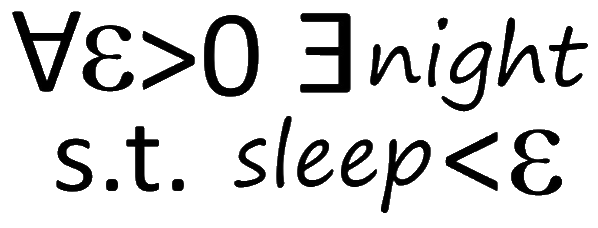Ramblings |
A Blog By Aidan Evans |
Logical Duality and "Et Cetera"
Post 1 | December 23, 2022
In the study of logic, many operators have a dual: AND gates have OR gates, universal quantifiers have existential quantifiers, and so on. We commonly use the term "etc." to abbreviate the Latin phrase "et cetera", which in English roughly translates to "and the like". We don't, however, have an abbreviation for "or the like" --- the dual to "etc.". Should we?
Now that I have gotten all my PhD applications in, fixed my website to include RSS support, and have a quick moment before going back to writing conference submissions tomorrow, I figured that it's about time I finally post something of substance on this blog. While this isn't the most profound or detailed post, I definitely consider it interesting.
The use of "etc." is prevalent all over ranging from emails and texts to papers and novels. It's extremely helpful when you just want to quickly note a couple examples and then convey in a concise way that the list goes on with similar things. The full phrase is "et cetera" which is Latin for roughly, "and the rest" or "and the like". The word "et" specifically translates to "and"; therefore, the phrase "et cetera" itself serves as a conjunction of items.
It would also be helpful to have a disjunctive form of this phrase for when we'd like to list a few options and then be like "or any other similar things." The distinction here is subtle but important. For example, consider being asked, "Can you buy me apples, oranges, etc.?". With this phrase, you are being asked to buy apples, oranges, and any other fruits similar to those such as maybe bananas or pears. The disjunctive form would be, "Can you buy me apples, oranges, or some other similar things?". Here, you are being asked to buy apples, oranges, or some other fruits similar to those; the person asking doesn't need both apples and oranges and other fruits but just some fruit, a fruit. The difference is that the conjunction "and" implies that you are being asked to buy all of the fruits listed while the disjunction "or" implies that you are being asked to buy only some of the fruits listed. The other day, I personally ran into the predicament of needing a disjunctive form of etc. to properly convey my intended meaning concisely. This got me thinking: "Is there a disjunctive form of 'etc.'?"
In the study of logic, many operations tend to have a dual. For conjunction (and), we have disjunction (or). Therefore, in asking whether there is a disjunctive form of "etc.", we are asking whether "etc." has a dual. Technically, the answer is yes: we can simply change the "et" to the Latin translation of "or". The Latin translation of "or" into English is "aut"; therefore, the dual of "et cetera" should be "aut cetera". Sadly, however, the English language never adopted this phrase. I think we should.
Latin abbreviations are not uncommon in English:
- etc. = et cetera = "and the like"
- e.g. = exempli gratia = "for example"
- i.e. = id est = "in other words"
What's one more? Especially when it's so useful and is clearly missing. I propose that we adopt "aut cetera" --- abbreviated "atc." --- as a concise way to say "or the like". I think it would be a great addition to English vernacular and would be extremely useful in certain situations. I'm not sure how to go about getting this popularized but I think it's a worthwhile consideration (even if only those who study grammar or logic would likely care enough to push for it).
